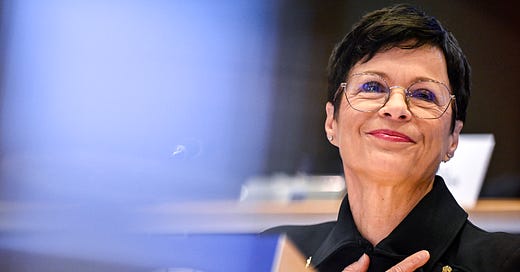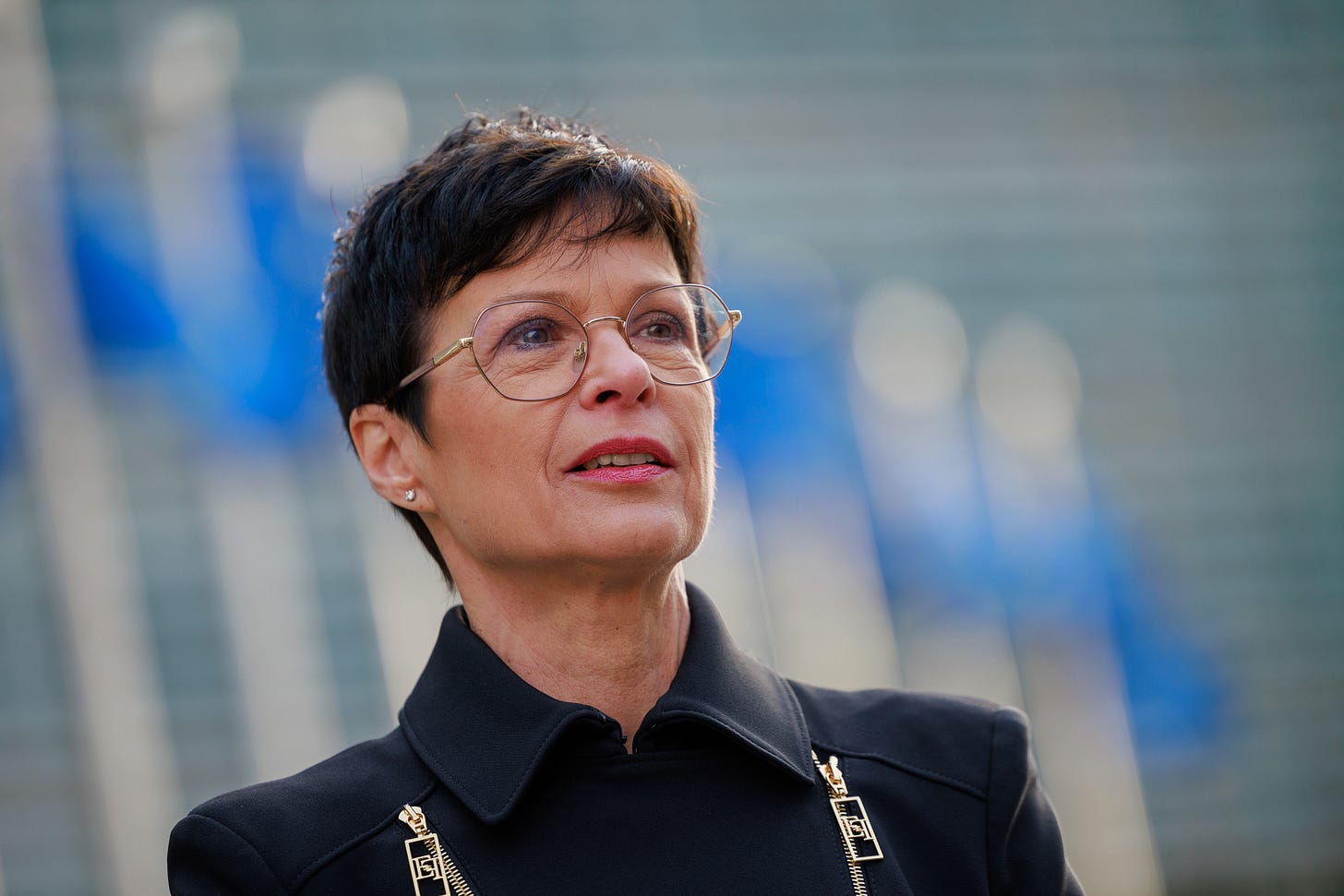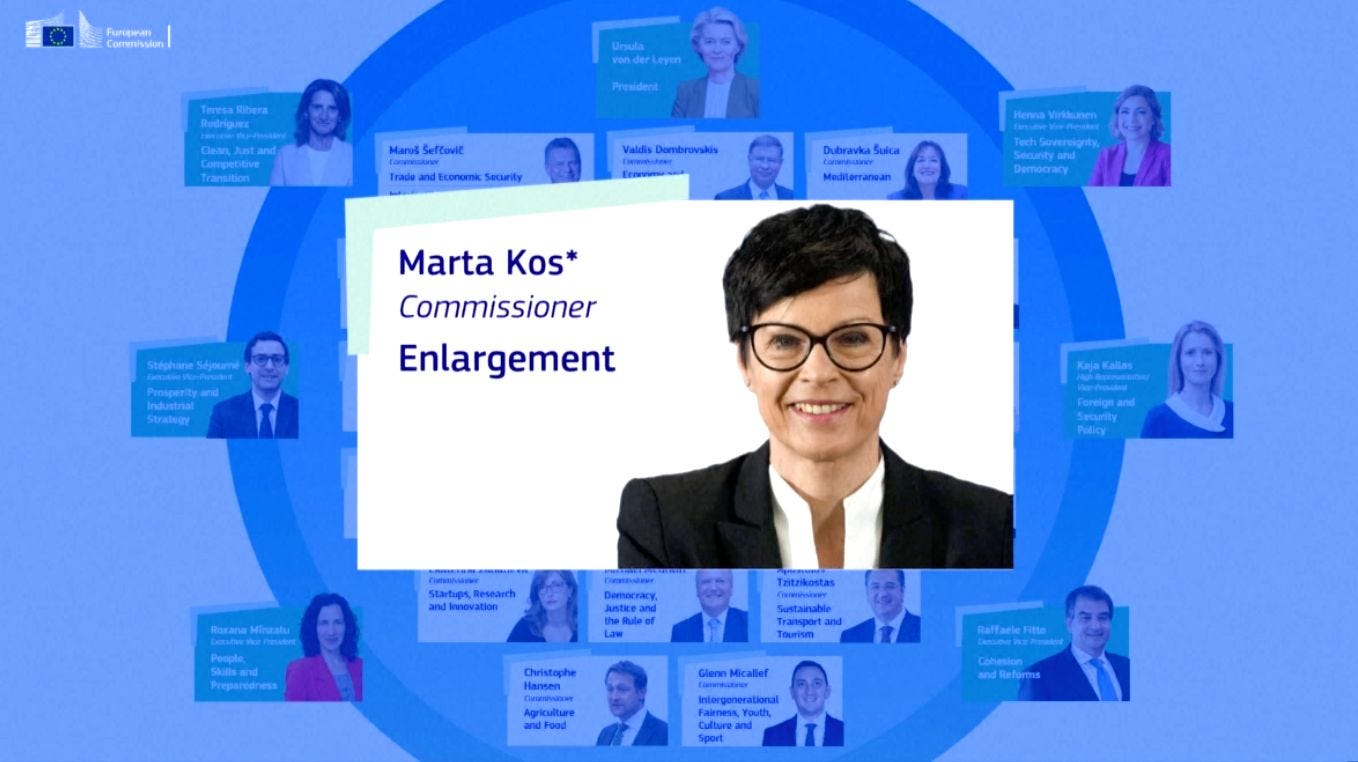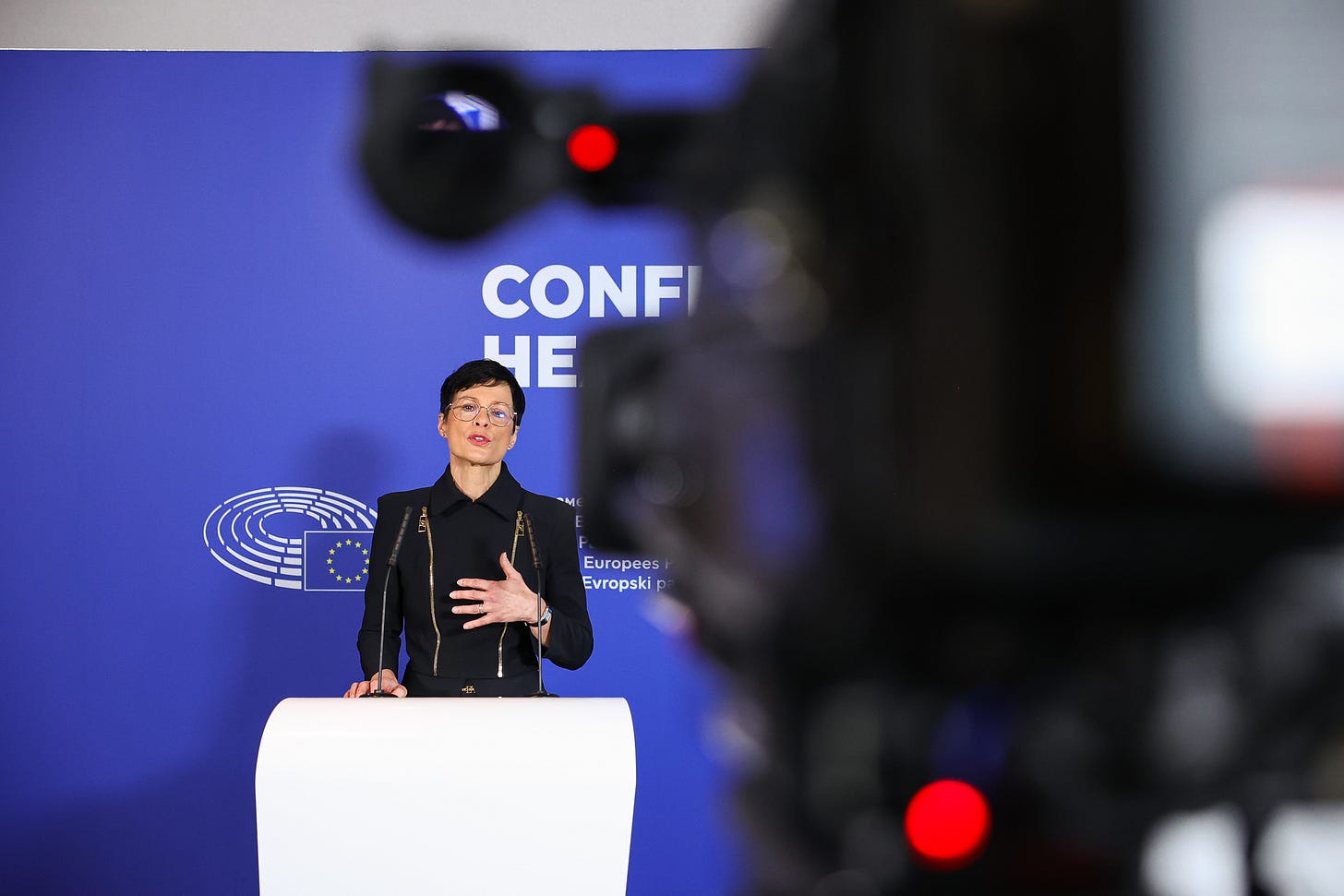S5E8. A new sheriff in town
Slovenian Marta Kos is the first European Commissioner for Enlargement from a country that was once part of the former Yugoslavia. She faces a mandate fraught with numerous complex challenges
Dear reader,
welcome back to BarBalkans, the newsletter with blurred boundaries.
November 2024 has been a highly political month.
Sometimes these periods come along. We just have to be patient and try to understand where we are heading.
After the political earthquake of Donald Trump’s re-election as President of the United States (you can read about it here), the European Union has not merely stood by.
The new European Commission, once again led by Ursula von der Leyen, is set to take office on December 1, following its approval by the European Parliament on November 27.
This moment brings a major development for the Balkans and beyond.
Slovenian Marta Kos is not only the first woman in the history of the European Commission to lead Enlargement Policy but also the first representative from a former Yugoslav country to hold this position.
“This portfolio is perhaps the best thing that could have happened to Slovenia. We can share our experience of having recently lived the EU accession process,” Kos said during her confirmation hearing at the European Parliament on November 7.
She faces one of the most complex and critical mandates ever in advancing the inclusion of new Member States—20 years after the “Big Bang Enlargement” (which included her native Slovenia) and over a decade since the last accession (Croatia, another former Yugoslav country, in 2013).
If Kos succeeds in signing new Accession Treaties and decisively bringing candidate countries closer to membership—despite the challenges and uncertainties of the international landscape—she could rightfully earn a place in the history of a united Europe.
There is a new way to support BarBalkans.
By donating a Bosnian coffee (or more) worth €1, you can help make this editorial project sustainable. You can also become a subscriber by donating a rakija for €5 per month.
Visit buymeacoffee.com/barbalkans and choose your favorite (virtual) drink!
Who is Marta Kos?
Born in Prevalje on June 28, 1965, Marta Kos was a Slovenian and Yugoslav swimming champion. She later earned a degree in Journalism and Political Science from the University of Ljubljana.
During her journalism career, Kos worked as a correspondent in Germany for Radiotelevision Slovenia and Deutsche Welle. She eventually transitioned to politics, initially heading the government’s press office and later serving as its spokesperson.
In 2013, Kos was appointed Slovenia’s ambassador to Germany. In 2016, Diplomatisches Magazin named her Ambassador of the Year, and German President Frank-Walter Steinmeier awarded her the Grand Cross of the Order of Merit of the Federal Republic of Germany, the nation’s highest honour.
In 2017, she became Slovenia’s ambassador to Switzerland, a role she held until 2020. Since then, she has worked in Switzerland as a consultant for businesses and international organisations.
Together with Slovenia’s current President Nataša Pirc Musar and Minister for Digital Transformation Emilija Stojmenova, Kos co-founded the ONA VE (She Knows) Association in 2021 to promote greater representation of women in the media and public events.
Aligned with the centre-left government of Prime Minister Robert Golob, Kos served as a member and vice-president of the Freedom Movement. In June 2022, she announced her candidacy for the Slovenian presidency but later withdrew.
In the spring of 2024, during the European election campaign, Kos was considered a potential leader for the Freedom Movement’s list. After declining the offer, her name emerged as a top candidate for Slovenia’s representative in the next European Commission.
Prime Minister Golob initially proposed Tomaž Vesel for the role. However, under pressure to ensure gender balance in the new College of Commissioners, the position ultimately went to the former ambassador to Germany and Switzerland.
One of the issues that has sparked public debate in Slovenia—and has been brought to Brussels by the Slovenian Democratic Party (affiliated with the European People’s Party)—is the alleged collaboration with intelligence services at the time of the Socialist Federal Republic of Yugoslavia.
“I was never an informant, and above all, when the UDBA [State Security Administration, ed.] was dissolved in 1966, I was only one year old,” Commissioner-designate Kos stated during her hearing at the European Parliament, responding to questions from the far-right group Patriots for Europe.
“Perhaps you mean the SDV [State Security Service, ed.], but at that time, I was a student working in Germany for Deutsche Welle radio service.” Kos emphasized that she had no knowledge of how her name ended up on a list of individuals allegedly linked to Yugoslav intelligence services.
“I’ve read many things about myself that even I didn’t know. Still, I have taken these allegations seriously, despite the personal pain they caused me. That list also includes three former Prime Ministers, three former Presidents of the Republic, and three former Members of the European Parliament. I don’t know how my name was included, but I want to make it absolutely clear that integrity has always been a guiding principle in my life, and I will not allow it to be undermined by disinformation.”
It is not uncommon for right-wing parties in post-Yugoslav countries to weaponize accusations of collaboration with former intelligence services as a political tactic. These allegations are often aimed at discrediting individual politicians or entire political movements.
Two clarifications are important in this context. First, neither the UDBA nor its successor agency formed after the 1966 reforms was particularly more oppressive or brutal than intelligence services elsewhere. They cannot be equated to the Soviet KGB or East Germany’s Stasi.
Second, the designation of “informant” within Yugoslav intelligence was often broad and administrative. Professionals such as journalists, diplomats, or professors who returned from missions abroad and were informally questioned about their activities could be categorized as “informants.” This label was often routine and did not necessarily indicate active or voluntary collaboration.
More than 30 years later, anything related to Yugoslavia remains a potent tool for political manipulation. These allegations are often leveraged to tarnish the credibility of politicians or undermine entire political parties.
This appears to be the strategy of former Slovenian Prime Minister Janez Janša, leader of the Slovenian Democratic Party, in targeting the Commissioner-designate proposed by his political opponents:
Is she the right choice?
Let’s be honest. No one has a crystal ball.
By the end of her mandate, Kos might be remembered as the worst European Commissioner for Enlargement (highly unlikely) or the best (not guaranteed, but certainly within the realm of possibility).
Her Slovenian background is undoubtedly an advantage.
Slovenia joined the European Union in 2004, and the memories of the high expectations and celebrations surrounding that achievement remain vivid. Equally fresh, however, is the awareness of the process’ limitations and the frustration felt by countries left waiting for years to gain access.
In recent years, Slovenia has been one of the most vocal advocates for accelerating the EU accession process for the Western Balkans, working to ensure the region does not feel abandoned while new candidates benefit from special treatment due to the pressures of Russian expansionism.
This advocacy has been especially beneficial for Bosnia and Herzegovina—likely to remain a focal point of attention in Brussels—but has also fostered progress across the entire region, supported by more credible targets and timelines.
Read also: S4E9. This is a tipping point
Kos’ extensive diplomatic experience is another significant asset.
At a time when enlargement has become a top priority for all EU institutions—especially in the wake of the war in Ukraine—a skilled diplomat is essential for navigating complex relationships with governments both within and beyond the Union.
She will need to strike a careful balance between mediation and compromise, addressing the legitimate EU aspirations of Ukraine and Moldova while acknowledging the significant challenges they face in implementing reforms.
A firm stance will also be necessary in dealings with Georgia’s government, which appears to be steering the country away from its EU future, and with Aleksandar Vučić’s Serbia, a challenging partner in areas like respect for the Rule of Law and alignment with EU sanctions against Russia.
Lastly, Kos must demonstrate impartiality regarding her home country, a steadfast commitment to the vision of a united Europe, and strict adherence to the limitations and responsibilities outlined in the EU Treaties.
In short, she must embody everything her predecessor, Hungarian Commissioner Olivér Várhelyi, failed to deliver.
What challenges lie ahead
“Further completing our Union is a geostrategic, economic and moral imperative,” reads the mission letter from President von der Leyen to the new Commissioner for Enlargement.
Notably, the role has returned to focusing solely on Enlargement, without the additional Neighborhood Policy portfolio, as it had been for the past 14 years.
First and foremost, there is the goal of welcoming new Member States. “Finally, there is an opportunity to close the chapters with Montenegro by the end of 2026 and with Albania by the end of 2027,” Kos announced during her confirmation hearing before the European Parliament.
Another crucial issue for the new Commission is the gradual integration of candidate countries. This means including them in specific EU programs while negotiations are ongoing, to “show not only governments but especially citizens that they can benefit even before joining” the Union.
Read also: S4E21. One vote can change everything
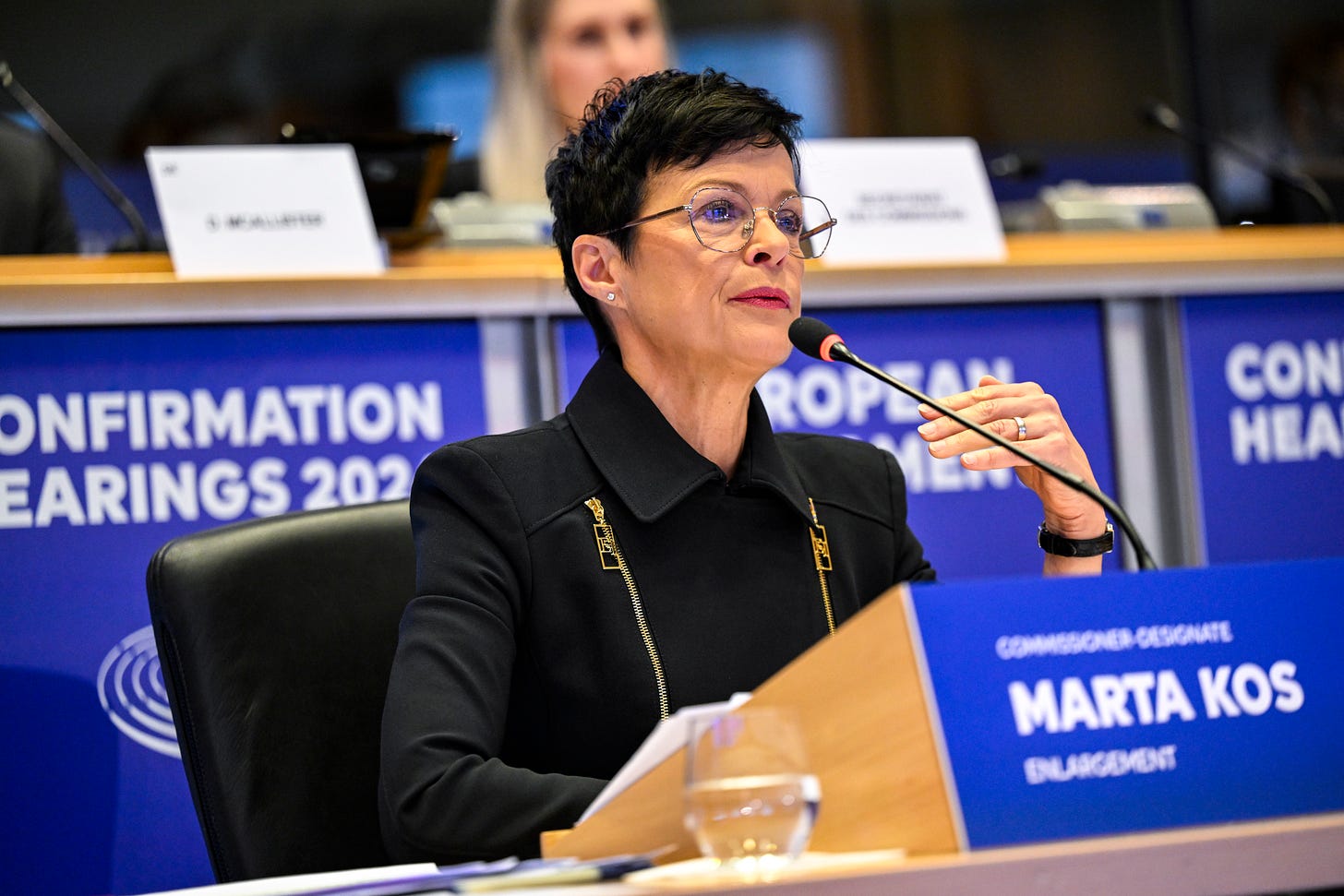
Then there is the Ukraine chapter. Concerning reconstruction efforts, “we are already working on internal reforms thanks to the Ukraine Facility.” As for future EU membership, “progress will depend on how long the war lasts,” Kos warned, while leaving the door open: “The hope is to begin negotiations on the Cluster on Fundamentals by early 2025.”
Among the most sensitive issues is the stalemate in the negotiations for North Macedonia’s accession, caused by Skopje’s opposition to amending its constitution on the issue of ethnic minorities. “The Macedonian government must do it. The dispute with Bulgaria must be resolved according to EU values,” Kos stated firmly.
Regarding the Serbia-Kosovo dialogue, “new methods” may be explored for resolving the dispute. However, “we will never consider a territorial swap” between the two countries, as the Trump administration might propose.
After the freezing of Georgia’s EU accession process (currently at candidate status) due to the political crisis triggered by the Georgian Dream party in May and worsened by election fraud in October, Kos reiterated that the “precondition” for reopening dialogue is the withdrawal of two laws that “contradict European values”: the law on foreign agents and the law against the LGBTQI+ community.
Finally, to grasp the full scope of Kos’ mandate, there is one more critical policy area she will address in coordination with her colleague responsible for Home Affairs, Austrian Magnus Brunner.
“Enlargement and migration are two sides of the same coin, because future members must also be ready to manage it,” Kos warned.
The Commission is closely monitoring the Italy-Albania asylum deal, though Kos clarified that this is “a bilateral agreement, not an EU project.” Even if “we will see how this arrangement will work,” it is no secret in Brussels that at the moment “it is not working well.”
The enlargement of the European Union during the next five years of the Commission’s mandate will also depend on these challenges. For better or for worse.
Pit stop. Sittin’ at the BarBalkans
We have reached the end of this piece of the road.
Today our bar, the BarBalkans, draws inspiration from the story of the new European Commissioner for Enlargement to highlight a specialty from her region of origin.
Slovenian Carinthia is renowned for Mošt, a traditional apple cider crafted through the alcoholic fermentation of juice from ancient apple varieties.
What sets Mošt from this mountainous region apart is the use of untreated fruit and a natural fermentation process.
Let’s continue BarBalkans journey. We will meet again in two weeks, for the 9th stop of this season.
A big hug and have a good journey!
If you have a proposal for a Balkan-themed article, interview or report, please send it to redazione@barbalcani.eu. External original contributions will be published in the Open Bar section.
The support of readers who every day gives strength to this project - reading and sharing our articles - is also essential to keep BarBalkans newsletter free for everyone.
Behind every original product comes an investment of time, energy and dedication. With your support BarBalkans will be able to elaborate new ideas, interviews and collaborations.
Every second Wednesday of the month you will receive a monthly article-podcast on the Yugoslav Wars, to find out what was happening in the Balkans - right in that month - 30 years ago.
You can listen to the preview of The Yugoslav Wars every month on Spreaker and Spotify.
If you no longer want to receive all BarBalkans newsletters (the biweekly one in English and Italian, Open Bar external contributions, the monthly podcast The Yugoslav Wars for subscribers), you can manage your preferences through Account settings.
There is no need to unsubscribe from all the newsletters, if you think you are receiving too many emails from BarBalkans. Just select the products you prefer!

